- Home
- Patricia MacLachlan
Baby Page 3
Baby Read online
Page 3
“La!” she cried mournfully.
“La!” Sophie said, smiling, when Lalo came to walk to school with me.
“I could stay home from school,” I said.
“You’ll do no such thing,” said Mama, “She’ll learn that you come back.”
At school the library had been freshly painted, the smell of paint mixing with the smell of old books. The shelves were dusted, the books neatly lined up as if daring us to take them down and read them. Ms. Minifred was slicked and clean and ready for us.
“Good morning. Sit up straight, Lalo,” she said. “Slumping may stop the blood from going to your brain.”
Lalo grinned. Under the library table was his new lunch box, black and shiny like Ms. Minifred’s hair. For Lalo another year like all the other years.
“This year we will be talking about the power of language,” said Ms. Minifred. “The power of words. And how words can change you.”
I stared at Ms. Minifred.
What about when there are no words? I thought. Silence can change you, too, Ms. Minifred.
Ms. Minifred looked at me, as if she had read my thoughts.
“Words,” she said.
She looked away, out the library windows, as if she was hearing words from far away. Then she waved her arm at the library shelves.
“In this room, in these books, there is the power of a hundred hurricanes. Wondrous words,” said Ms. Minifred.
Lalo and I looked at each other and smiled. Another year.
Mama was right. Sophie was waiting for us at home, her face pressed against the window, when Lalo and I came up the porch steps at the end of the school day.
The second week of school Sophie took her first step, pushing off from Papa’s tiled tap-dancing table. Papa clapped, Byrd smiled, Mama cried, and from then on Sophie walked; sometimes tilted forward as if a wind pushed her; sometimes tottering so that our hands went out to protect her.
Sophie rode the island’s dirt roads on a seat on the back of Mama’s bicycle, pointing to dogs and cats. She learned to wave by cupping her hand and waving to herself. She learned what the word hot meant when she touched the oven door, and that no meant no when she went near Mama’s wet canvases.
And then very suddenly one day she began to put her hands behind her back and bring them out in fists, hands flat, or two-fingered shapes.
“Rock, paper, scissors,” said Papa softly. “Sophie learned. She doesn’t know what it means, but she learned.”
Mama smiled.
“That’s how it is with children,” said Byrd. She paused. “Someday, she will remember all of this in some way, you know.”
We looked at Byrd, then at Sophie. Mama turned from the window, her smile fading, all of us thinking of Sophie’s mother. Papa watched Mama. It was as if Byrd, in one sentence, had pulled Sophie back from us to a place where we couldn’t follow.
Sophie got up unsteadily and looked at Papa. She picked up one foot and put it down. She did it again.
“The shuffle,” whispered Mama. “She wants you to dance.”
Mama watched Papa.
“She wants you to dance,” she repeated, her voice so thin, it almost broke.
There was a silence. Then Papa leaned over and picked up Sophie. Slowly he began to dance holding her, Sophie beginning to grin at him. But Papa didn’t grin back at her. He looked at Mama as he sang.
Me and my shadow
Strolling down the avenue.
Me and my shadow,
Not a soul to tell our troubles to.
And when it’s twelve o’clock,
We climb the stair;
We never knock
For nobody’s there.
Papa and Sophie danced a long time, the late afternoon light falling over them like a spotlight. Mama watched, standing by the window. Byrd sat, straight as a tree. Only Lalo smiled.
“Come, Larkin,” called Papa. “Dance with us.”
I shook my head. “I can’t,” I said.
The next day Sophie’s letter came, almost as if Byrd’s words about Sophie’s mother had made it happen. Five one-dollar bills slipped out of the letter in Mama’s hand as she read.
Dear Sophie,
Happy birthday. I love you. I think of you every hour, every minute of every day.
Don’t forget me.
Love,
Mama.
winter
She loved the wind and she loved music. She remembered them together; the sound of the wind in the marsh grass and a song that she dreamed, a thread sound of song that she couldn’t remember when she woke.
chapter 7
Winter came fast with a surprising sudden snow the day before Thanksgiving. We bought Sophie a snowsuit, red boots, and mittens, knowing that the snow would never last. Island snow never lasted. Sophie didn’t like the mittens; she didn’t like the snowsuit; she didn’t like snow. Sophie did like her red rubber boots, shuffling around the house in them during the day, taking them to bed with her that night.
We ate Thanksgiving dinner in the dining room; the glasses gleaming, candles lighted, Sophie in her red boots. Dr. Fortunato stopped by on his way to see Rollie’s wife, who had a temperature, but he really came to see Sophie. Griffey came to eat with us, and he played his accordion for Sophie. She liked “Roll Out the Barrel” and loved “Amazing Grace.”
“Mo,” said Sophie. “Mo.”
“You’d better learn some new songs,” said Byrd.
“I’m working on it,” said Griffey, insulted. “The sewer business is busy, you know.”
Griffey began to play “Amazing Grace” again.
“She loves this song,” he said to Byrd. “She does.”
Byrd nodded.
“She has taste, this child,” said Byrd.
Later we walked to town, everyone coming out to say hello and to wave to Sophie and to call happy Thanksgiving from their porches. The light sat like porcelain on the water; the sea calm, the sky the gray of silver-dollar plants.
That night Papa danced good-night for Sophie, dancing “Me and My Shadow” over and over. Lalo taught Sophie how to blow a kiss. Mama got out her sketchbook and began to draw Sophie, the lamp spilling light over her work. I looked over her shoulder as she drew Sophie, all rounded edges, and then the sharper larger figure of Papa holding her.
“Do you think she remembers?” I asked her suddenly.
Mama looked up at me. Her eyes shone bright.
“Remembers?”
“Remembers her mother,” I said. “Do you think she misses her?”
Mama stared at me.
“I don’t know,” she said after a moment. “But it doesn’t matter, Larkin. We’re doing the right thing.” Mama sat back and looked at me. “You know that, don’t you? Sometimes you have to do what is right.”
What is right. I didn’t answer, but I felt my face grow hot with sudden anger. There were words in the spaces between us; those words we had never spoken, words about what I thought was right. It was hard to say what I thought without getting rid of those words first. Mama, staring at me as if she knew my thoughts, suddenly straightened her shoulders and went back to her drawing. Conversation was over, that one subject that stood between us closed. I watched her sketch, hating the look of her hand slipping across the paper as if she was brushing away all the words I needed to hear. Papa and Sophie came to life on the page, the two of them sitting in a chair by the fireplace now; Sophie imitating Papa—rock, paper, scissors—her hands, almost like Mama’s: quick shadows like butterflies in the firelight.
“They never named him,” I said.
We stood on Lalo’s favorite place on the island, the north cliffs that stood high above the water. Lalo liked the high places, the dangerous edges of the island that always scared me. He isn’t afraid of anything. Lalo looked at me for a moment. His hair blew across his face. He turned, then threw a rock out over the water. He leaned down to watch the rock disappear, a tiny splash from where we stood. I shivered and pulled my hat down ov
er my ears, hooking my fingers in Lalo’s belt as I always did.
Lalo straightened and smiled at me. This was his favorite cold, windy weather, too, and he only wore a sweatshirt.
“I won’t fall, Larkin. I never fall, so stop worrying. Remember? Once I slept in a tree.”
I remembered. His mother had once taken him to a new barber who cut Lalo’s hair too short. Lalo hid from everyone, spending a day and a night up the tree by the pond until his mother lured him down with kale soup and cake.
“You haven’t fallen yet,” I said. I looked out at the water, gray and dark, whitecaps everywhere. “But things happen when you don’t think they will. Things happen that you’ve never even thought about. Ever.”
We began to walk the cliff path toward town.
“So,” said Lalo. I could see his breath hang in a cloud. “It’s only been six months since he”—Lalo looked sideways at me before he finished— “since he died. Mama said it takes people time. She says it’s different for different people.”
I didn’t say anything. Lalo picked up another rock and drew back his arm to throw it.
“Why didn’t they name him?” I asked.
Lalo paused, then threw the rock way out over the water.
“So,” he said, his hair lifting strangely in the wind, “you name him.”
I stopped.
“What?”
“You always do that,” said Lalo. “You always say, ‘What?’ when you don’t know what to say. Or you don’t want to answer. The fact is, if you need him named, then you name him.”
I stared at Lalo and he stared back. Then he turned and began walking again. I stood, watching him as he walked down through the beach plum; past the clumps of chickory gone by; past the juniper bushes.
“You’re dumb,” I yelled at Lalo. “You’re so dumb. The very dumbest!”
The sky darkened above suddenly, a cloud in front of the sun, like in a movie when it was suddenly serious and you’d better pay attention. Lalo disappeared over the hill and I stopped yelling. Then, after a moment, he appeared, looking at me.
I looked at the sea again, then I walked after him. When I reached him he was sitting by the old scrub oak tree that perched at the edge of the cliff.
I stood next to him and looked down on the town. I could see a car moving along Main Street, the church spire in the middle, a fishing boat coming into the harbor.
“It wouldn’t matter, you know,” I said. “It wouldn’t matter as much, except—” I stopped.
Lalo looked up at me.
“Except that Sophie’s here,” he said.
Tears came then, I couldn’t stop them, flooding down my face, cold and startling. Lalo didn’t move. He didn’t come over to put his arm around me, or put his hand on my arm. He just stared out over the water. And I cried, thinking about what my father had said to me not so long ago.
“Don’t love her,” he had said to me about Sophie.
Don’t worry, Papa. I don’t know how to love Sophie. I don’t know how to love Sophie because I don’t know how to love my brother.
I cried.
Lalo sat under the tree, not looking at me.
The sun came out.
chapter 8
“My Wish for the World.”
Portia Pinter stood in front of the class, reading in her high voice.
Someone snorted.
Ms. Minifred gave a piercing look to the back, probably to Ozzie, who always snorted. He had four brothers who snorted too. Lalo said it was part of the family tradition.
“My Wish for the World,” repeated Portia, pushing up her glasses, “is for world peace and homes for stray animals, especially cats.”
Another snort. Ms. Minifred smiled.
Portia, short with jeweled eyeglasses, had told us once she had relatives in the royal family of England. Lalo called her Princess Portia.
Portia’s voice droned on. We were in the library, where water was leaking down the walls. It had rained for three days straight, so hard and fierce that at home Mama put towels on the windowsills and under the door where the water streamed in. Papa left early for work and came home in the evening wearing his yellow slicker, the wind nearly blowing him down the hill. Byrd sang songs and read books to Sophie, who happily pointed out new streams of water.
At school we had all helped move the books to the middle of the room, and Rebel, the janitor, had come up from the basement to turn off the electricity. Rebel had come to the island with his Harley-Davidson motorcycle when he was eighteen and had never left. That was fifteen years ago. We had seen pictures of him then, and he hadn’t changed. He was still thin, and his hair stood straight up. He had a mysterious tattoo on his arm that said “Wild Eunice.”
Rebel liked Ms. Minifred. Rebel and Ms. Minifred read books together. Lalo and I had come late to the school library one afternoon, and they had been at a library table, Rebel sitting on a child’s chair, smiling, his chin resting on his knees as he read to Ms. Minifred.
Rebel had a bookcase in the basement filled with books. Lalo had seen it once when he went down to borrow a screwdriver.
“All poetry,” Lalo had said, impressed.
“That’s because Rebel is anguished,” said Portia. “All anguished people read poetry. He has a lost love somewhere. Eunice, you know. Ms. Minifred is helping him through the power of wondrous words.”
Ozzie snorted.
“He has lots of loves,” he scoffed. “I’ve seen him around town with girls on the back of his Harley.”
“They are only temporary,” said Portia, her jeweled glasses gleaming in the darkened room, “until Wild Eunice returns.”
Today Rebel stood at the back, listening to Portia, his tool chest at his feet, his arms folded so we could see Wild Eunice on his arm; red letters with green ivy surrounding them in a violent sort of way. He had never stayed in class before. He had always come to work, then disappeared back into his room in the basement. I thought suddenly of the day that Griffey’s goat had jumped his fence and walked through town and into the school, a strange sight in the schoolroom, interrupting the familiar rhythm of the class. Somehow Rebel seemed too big for the room, filling it up with leather and spiked hair.
Rebel saw me watching him, and he mouthed the words How’s Sophie?
Fine, I mouthed back. Walking.
Rebel smiled broadly.
“Also,” Portia went on, “it would be quite excellent to have clean air, clean water, and clean houses. In conclusion,” said Portia, stopping to take a breath, “cleanliness is next to godliness.”
Portia looked at the class. “My mother says so,” she added.
A snort from the back.
“Thank you, Portia,” said Ms. Minifred.
“There’s redundancy there,” said Rebel.
Everyone turned to look at Rebel, who never spoke up when he was in the room.
“Yes, most assuredly there is,” said Ms. Minifred. “You don’t need to say ‘quite excellent,’ Portia. Excellent is its own definition. It stands alone.”
“Yep,” said Rebel, picking up his toolbox and pausing at the door to look at Ms. Minifred. “It doesn’t get any better than excellent.”
There was what Ms. Minifred called a “pulsing silence” as Rebel went out the door. Then Ms. Minifred spoke.
“Yep, indeed,” said Ms. Minifred, her face flushed. “Wondrous words spoken by Rebel. It doesn’t get any better than excellent.”
Lalo and I looked at each other. It was, of course, the yep that did it. In that moment, the room so damp that my hair had begun to curl on its own, Lalo and I knew that there was more than words between Rebel and Ms. Minifred.
Lalo leaned over to whisper.
“So. Do you think anyone else noticed?”
I shook my head. Everyone else was rustling papers.
“Poor Ms. Minifred if Wild Eunice ever finds out,” I whispered back.
Lalo grinned suddenly at me, then at Ms. Minifred.
“I think Ms. Minifred
can take care of herself,” he said softly.
And then, Ms. Minifred looked up suddenly and smiled at us. A real smile, with teeth.
“Tomorrow is poetry,” she said. Her smile grew wider. “All the world can be found in poetry. All you need to see and hear. All the moments, good and bad, joyous and sad.”
Lalo leaned close to me.
“Rebel will be back,” he whispered.
All the world.
Lalo and I walked home through town, the wind pushing us along, our feet wet even though we wore rubber boots. The harbor was black, waves topped with gray. We passed the newspaper building, and I looked in and saw Papa reading at his desk, his reading lamp shining on the wood. We passed the hardware store and the drugstore and food mart with the D missing so it read FOO MART.
I pulled my slicker around me and held my rain hat on to keep it from blowing away.
All you need to see and hear.
Lalo tugged at my arm.
“What?”
“Home,” said Lalo.
I looked up and saw the inn, the porch all wet and windswept. Lalo pulled me up the steps, and we took off our hats, standing there, listening to the rain on the porch roof
“So?” Lalo said.
“I’m thinking about poetry,” I said.
“I knew that,” said Lalo matter-of-factly.
“And what Ms. Minifred said.”
Lalo nodded.
“And I’m thinking about—” I began.
“The world,” said Lalo.
I looked at Lalo.
“Poetry is just words,” I said.
“That’s all we’ve got,” said Lalo.
I stared at Lalo. The rain came harder.
And when I left Lalo and ran up through the wind and rain to my house and opened the door, Mama and Sophie were at the kitchen table, Sophie covered with finger paint, her fingers squishing the red on the white paper. My mother turned, and on her face were tiny finger marks where Sophie had touched her. They had dried there as if she had left her marks on Mama forever. They both smiled at me, and Sophie reached out her hands to touch me too.
Ms. Minifred’s wrong, I thought, as I left my slicker dripping in the hallway and went to join them. There are no words for this.

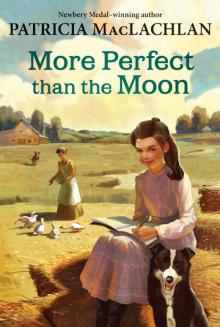 More Perfect Than the Moon
More Perfect Than the Moon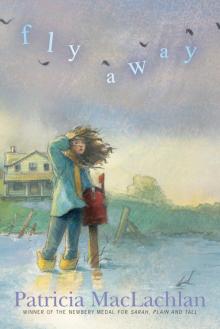 Fly Away
Fly Away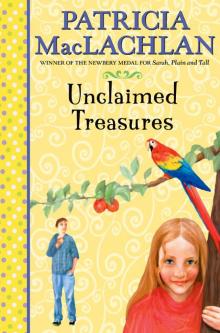 Unclaimed Treasures
Unclaimed Treasures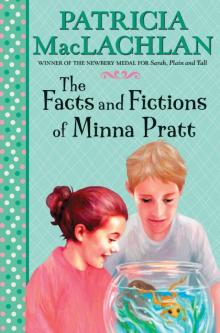 The Facts and Fictions of Minna Pratt
The Facts and Fictions of Minna Pratt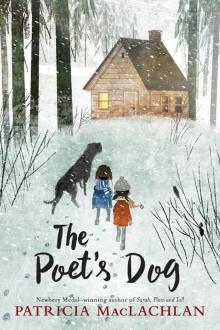 The Poet's Dog
The Poet's Dog Journey
Journey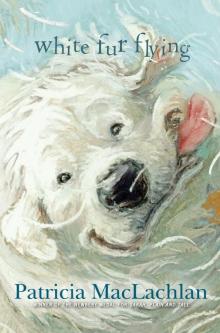 White Fur Flying
White Fur Flying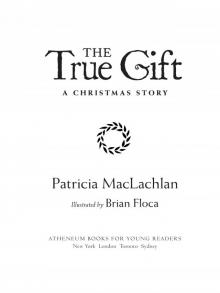 The True Gift: A Christmas Story
The True Gift: A Christmas Story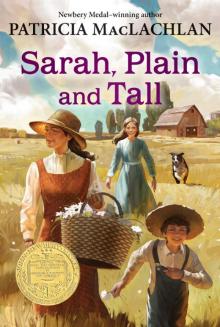 Sarah, Plain and Tall
Sarah, Plain and Tall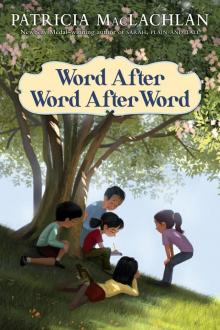 Word After Word After Word
Word After Word After Word Seven Kisses in a Row
Seven Kisses in a Row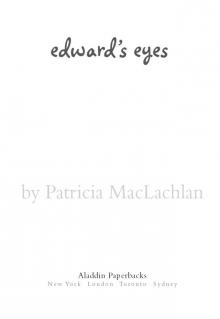 Edward's Eyes
Edward's Eyes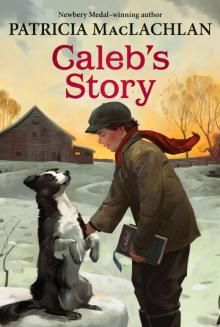 Caleb's Story
Caleb's Story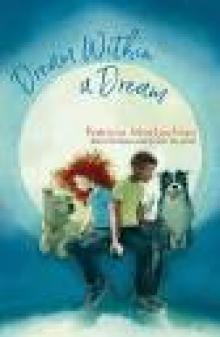 Dream Within a Dream
Dream Within a Dream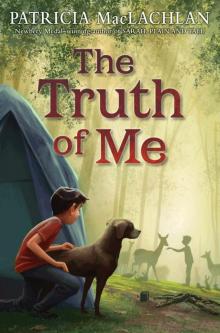 The Truth of Me
The Truth of Me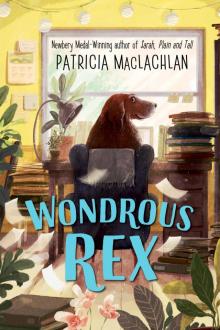 Wondrous Rex
Wondrous Rex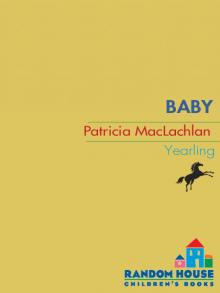 Baby
Baby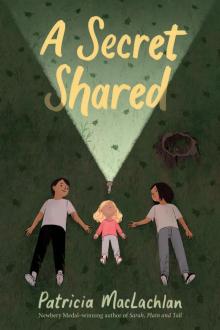 A Secret Shared
A Secret Shared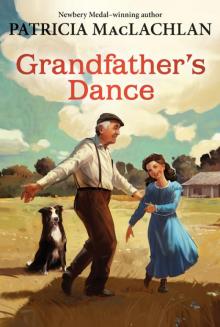 Grandfather's Dance
Grandfather's Dance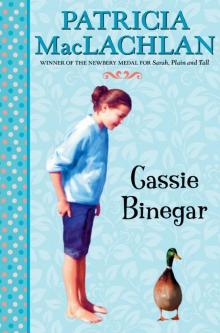 Cassie Binegar
Cassie Binegar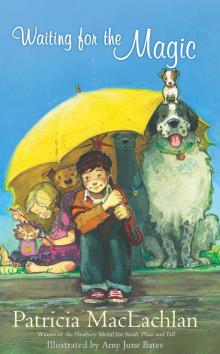 Waiting for the Magic
Waiting for the Magic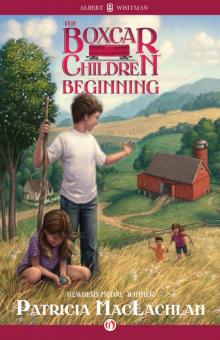 The Boxcar Children Beginning
The Boxcar Children Beginning My Father's Words
My Father's Words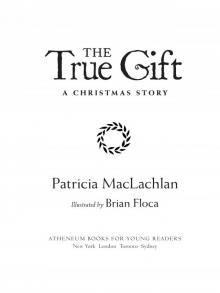 The True Gift
The True Gift